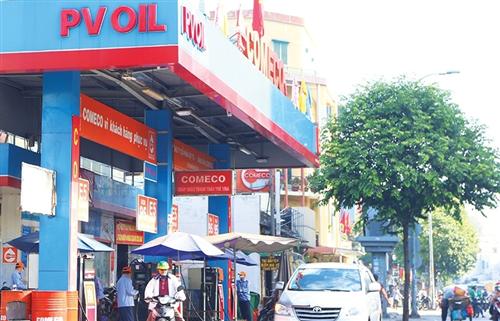Cement demand foercast to climb 4-5% this year
Cement demand foercast to climb 4-5% this year
The Ministry of Construction has forecast cement demand will increase by 4-5 per cent this year thanks to a recovery in the real estate market. 
Demand is estimated to reach 101-103 million tonnes, an increase of 4-5 per cent from last year, of which 69-70 million tonnes will be used at home and 32-34 million tonnes will be shipped overseas.
According to the Department of Construction Materials, two cement production lines are expected to be put into operation this year, bringing the total number of cement production lines in Viet Nam to 86 with a total output of 105.84 million tonnes. However, Nguyen Quang Cung, chairman of the Viet Nam Cement Industry, said the construction material market this year would remain unchanged from last year, and could even slow.
Enterprises should reduce output and renew technology to increase quality, according to Cung. Now, they should not only focus on profits but also on product quality.
The current difficulties facing cement companies include rising fuel prices and wages, environmental issues and technology. A proposal has also been put forward to impose an environmental tax on cement manufacturers.
In addition, the construction ministry said cement exports from China and Thailand could increase so Viet Nam would face more competition in the global market.
Domestic enterprises needed to follow the global market to adjust production and maintain stable prices with a long-term production and business strategy.
To stabilise the domestic cement market this year, the construction ministry has asked the Ministry of Industry and Trade to increase prices of key commodities such as electricity, coal, petrol and oil.
The ministry has asked the Viet Nam Coal and Mineral Industry Group to stock enough quality coal for cement plants while Viet Nam Electricity needed to ensure enough power for cement production.
Cement experts said Vietnamese enterprises need to identify existing difficulties to renew their technology and produce better quality products and improve their competitiveness.
A number of large cement enterprises said they were focused on green development in production and business, use of new technology, saving natural resources and protecting the environment.
According to the ministry, the cement industry’s growth exceeded 2 per cent in 2019.
Despite facing increasing fuel prices and fierce competition, the industry still witnessed growth in domestic consumption and exports.
The total consumption volume of cement and clinker in 2019 reached about 98 million tonnes, an increase of 2 per cent year-on-year. Domestic consumption reached 67 million tonnes, up by 1 per cent, while the export volume stood at about 32 million tonnes, earning US$1.27 billion.
According to Cung, the growth in domestic consumption did not reach the goal of 5-7 per cent. Meanwhile, exports exceeded the target of 25-27 million tonnes set for 2019.




























